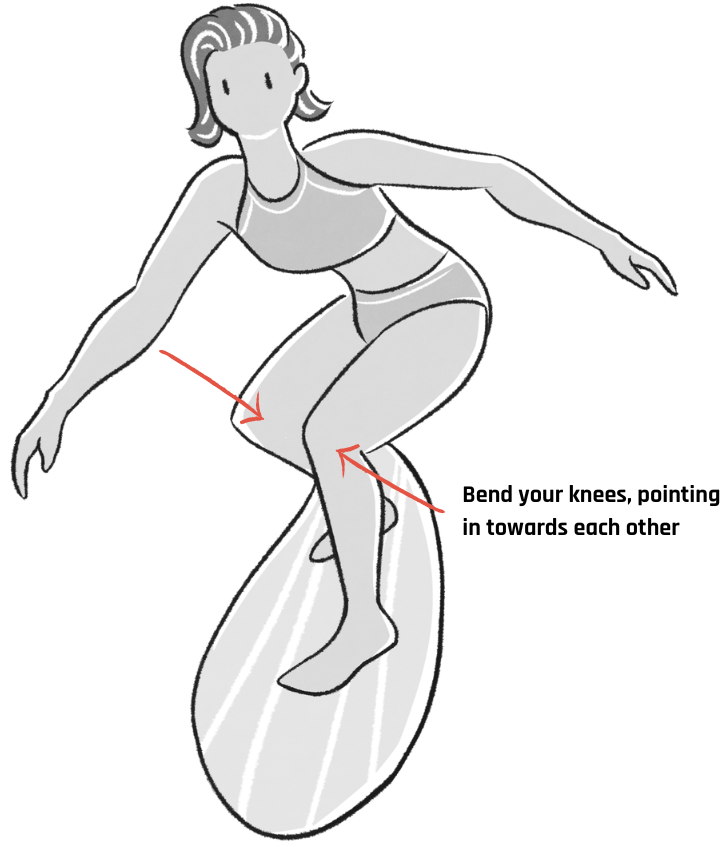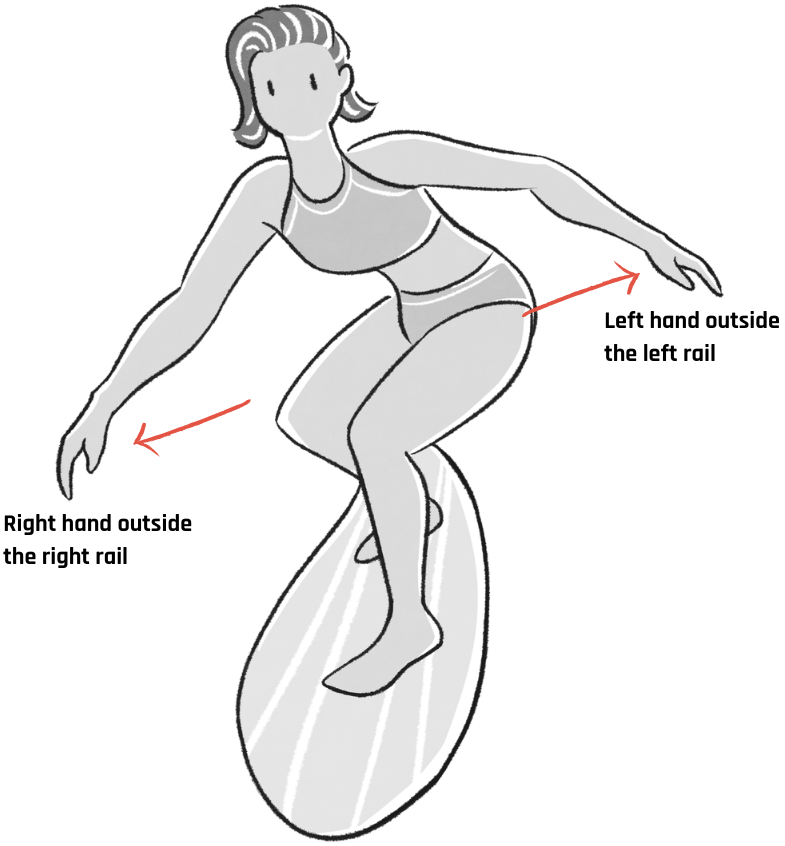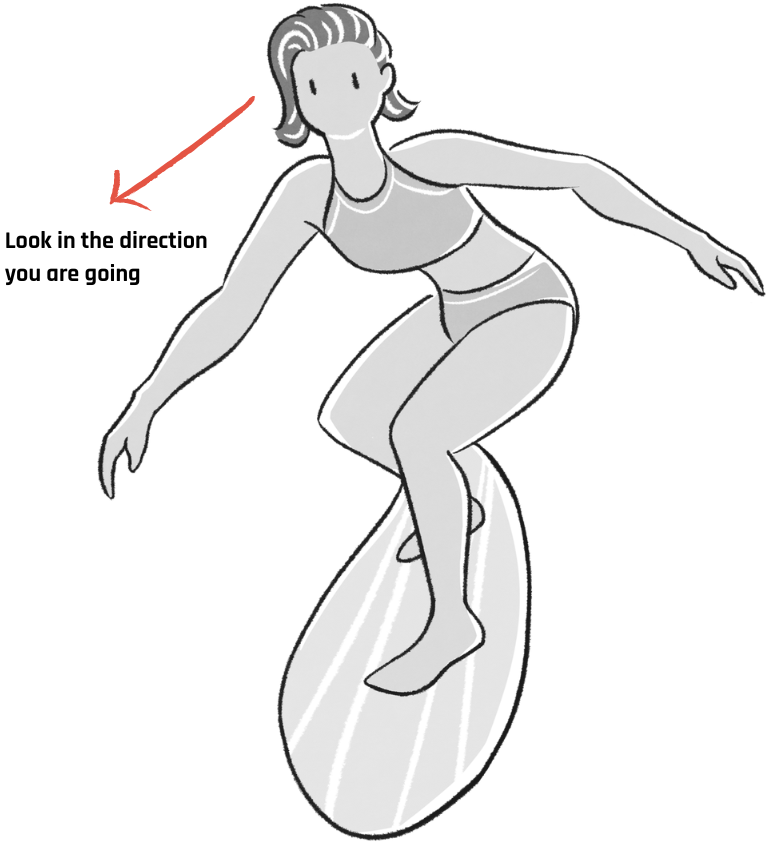How to achieve the correct surfing stance in 6 steps
Lesson 18
- Written by Emilia
- Published March 10, 2024
Post contents
Introduction
To achieve the correct surfing stance, start by figuring out if you are more comfortable to surf goofy or regular. A regular surfer leads with the left foot forward on the board, while a goofy foot surfer leads with the right foot forward.
The 6 key steps to achieve a correct surfing stance include 1) positioning your feet at the center of your surfboard’s width, 2) keeping the space between your feet shoulder-width apart, 3) bending your knees, pointing in towards each other, 4) keeping your upper body straight, 5) keeping your hands outside of the rails, and 6) looking in the direction you are going.
Now, let’s dive into the details of surfing stance and how to do each step correctly!

What is surfing stance and why is it important?
Surfing stance is about how you position yourself on a surfboard while riding waves. It’s important because it affects how stable and balanced you are, which, as you can imagine, is pretty crucial when you’re trying to stay upright on a moving wave.
The two surfing stances: regular vs goofy surfing
Why understanding regular vs goofy surfing matters for your surfing stance
Before diving into how to achieve the correct surfing stance, let’s explore regular vs goofy surfing. Understanding the differences between these two styles can help you determine which one suits you best and lays the foundation for mastering your surfing pose on the waves.
What is regular vs goofy surfing?
A regular surfer leads with the left foot forward on the board, while a goofy foot surfer leads with the right foot forward. It’s kind of like being left-handed or right-handed, but for surfing!
Choosing your surfing stance: should you surf goofy or regular?
Honestly, it’s totally up to you! Some people just feel more comfortable surfing one way or the other. You can try both and see which feels right for you. I myself am regular-footed, and so are the majority of other surfers.
Tip: A small test to determine if you should surf goofy or regular
To determine if you’re regular or goofy-footed, try the “falling” test: close your eyes, relax, and allow yourself to start falling forward. Note which foot instinctively moves forward to catch your fall. If it’s your left foot, you’re likely regular-footed; if it’s your right foot, you’re probably goofy-footed.
Regular stance:

Goofy stance:

6 steps to achieve the correct surfing stance
Now, let’s get into the nitty-gritty of how to nail that perfect surfing pose!
1. Foot position on surfboard: position your feet at the center of your surfboard's width
How:
To achieve a stable surfing stance, start by ensuring that both of your feet are positioned at the center of your surfboard’s width, with your arches on the stringer*. Your back foot should be 90° to the stringer, and your front foot should be 45° to the stringer.
*The stringer is the line that runs down the center of the surfboard from the nose to the tail, vertically separating your board in two (some surfboards do not have a visible stringer and if that is the case for your board you can instead imagine it). You can learn more about the surfboard’s anatomy in this article.
Why:
This alignment will help you maintain balance and avoid falls caused by uneven weight distribution on either side of the board. For example, if the arches of your feet are placed too far in front of the stringer, you are likely to fall forwards.

2. Foot position on surfboard: keep the space between your feet shoulder-width apart
How:
Find the perfect distance between your feet, aiming for a width that is approximately equal to the span of your shoulders. Your back foot should be positioned near the tail of the board, and your front foot will probably end up somewhere in the middle section of the board.
Why:
This shoulder-width stance provides a solid foundation for stability and control, enabling you to effectively shift your weight back and forth. Avoid extremes in stance width, as too narrow or too wide a stance can hinder your ability to shift your weight and thereby adjustment of speed on the waves.

3. Bend your knees, pointing in towards each other
How:
Bend your knees slightly and ensure that they are pointing inward towards each other. Additionally, consider tucking your back knee inwards slightly for added flexibility.
Why:
This posture not only enhances stability but also allows for smoother weight transitions, enabling you to adjust your position on the board for acceleration or deceleration as needed. Avoid the poo stance, which is characterised by having your knees pointing apart- it makes you less flexible in your movement and impacts your ability to accelerate or reduce speed.

4. Keep you upper body straight
How:
Maintain a relaxed yet upright posture, with your shoulders squared and your back straight. Avoid slouching or leaning too far forward in your surfing pose.
Why:
Not maintaining an upright posture can disrupt your balance and affect your ability to turn.

5. Keep both hands outside of the rails
How:
Keep your left hand outside the left rail of your surfboard and your right hand outside the right rail of your surfboard.
Why:
This hand placement not only enhances balance of your surfing pose but also facilitates smoother turns by providing additional support and control. Avoid placing both hands on the same side of the board, as this can disrupt your balance and hinder your ability to make turns.

6. Look in the direction you are going
How:
Once you’ve established the correct surfing stance, remember to keep your focus forward and your eyes fixed on where you want to go- I’ve heard this a lot from my surf teachers as I keep forgetting. It’s probably one of the things I struggle with the most but helps a lot when I do remember it!
Why:
Your head acts as your steering wheel, guiding your movements and helping you navigate the waves with precision.

Lesson quiz: test your knowledge

Time's up
I’d love to hear your thoughts on this post! Whether you have suggestions for improvement, want to share what you liked, or have any questions, feel free to leave a comment below. Your feedback helps me create better content for all aspiring surfers!